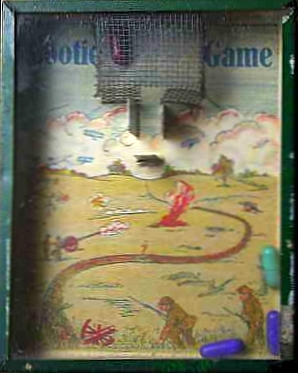Cooties facts for kids
Have you ever heard someone say "You've got cooties!"? Cooties is a made-up childhood sickness. It's often used in games or as a way to playfully say someone is "yucky" or "untouchable." This idea is popular in the United States and Canada. Similar ideas exist in other countries like the UK, Italy, Australia, and New Zealand. Kids often say you can "catch" cooties from someone else, especially from someone of the opposite sex or someone they think is "different."
Contents
Where Did "Cooties" Come From?
The word "cooties" might have come from a group of languages called Austronesian languages. In languages like Filipino, Malaysian, Indonesian, and Maori, the word kuto or kutu means a small, biting insect, like a louse.
However, some people think the word "cooties" might have come from "cuties," used in a joking way.
Cooties and Soldiers
The earliest times we see the word "cooties" in English were during World War I. British soldiers used it to talk about the lice that were common in the trenches where they lived. These tiny insects were a big problem for them.
Cootie Games and Toys
The idea of cooties became even more popular with games.
- In 1915, the Irvin-Smith Company made a game called Cootie Game. It was a hand-held game where you tilted capsules, which were the "cooties," into a trap.
- Many other "cootie" games followed, all involving some kind of "bug."
- The most famous one, The Game of Cootie, came out in 1948. This game was a huge hit!
- In 2003, it was even named one of the most memorable toys of the 20th century.
The term "cooties" also became well-known in America in the 1950s. This was partly because soldiers returning from war had heard the term from British soldiers. The idea of cooties also grew during the polio sickness in the early 1950s, becoming linked with dirt and things that could spread germs.
Other Names for "Cooties" Around the World
The lice that soldiers called "cooties" during World War I were also jokingly called "arithmetic bugs." This was because "they added to our troubles, subtracted from our pleasures, divided our attention, and multiplied like hell."
Other countries have similar playful terms for this idea:
- In Italy, children use the term la peste, which means "the plague."
- In Denmark, they say pigelus (girl lice) and drengelus (boy lice).
- In Norway, it's jentelus (girl lice) and guttelus (boy lice).
- In Sweden, they use tjejbaciller (girl bacilli) and killbaciller (boy bacilli).
- In Finland, it's tyttöbakteeri (girl bacteria) and poikabakteeri (boy bacteria).
- In Serbia, the game is called šuga, which means scabies.
How the Cooties Game Is Played
Kids often say you "catch" cooties from touching or being too close to an "infected" person. This person might be someone of the opposite sex or someone who seems different. For example, it could be someone who is shy or has unique habits.
This game is most common among elementary school children, usually between four and ten years old. However, older kids might use the phrase in a funny or sarcastic way. Sometimes, kids will even say a specific type of cooties, like "You've got girl cooties!" or "You've got boy cooties!" if someone touches a child of the opposite sex.
The Cootie Shot
In the United States, children sometimes pretend to "immunize" each other from cooties. This is called a "cootie injection" or "cootie shot."
- One child will use their index finger to draw circles and dots on another child's forearm.
- While doing this, they often say a rhyme: "Circle, circle, Dot, dot, – Now you've got the cootie shot!"
- Some versions add more lines, like "Circle, circle, Square, square, – Now you have it everywhere!" This means the "immunization" spreads throughout the body.
- Another line might be, "Circle, circle, Knife, knife, – Now you've got it all your life!" There are many different ways kids play this game.
Images for kids
 | Anna J. Cooper |
 | Mary McLeod Bethune |
 | Lillie Mae Bradford |



